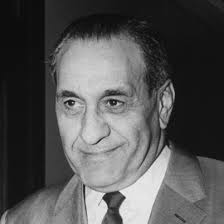Anthony Accardo (Anthony Leonardo Accardo)

Anthony Accardo
Organized Crime Figure. Born in Chicago, Illinois in 1906, he joined the city’s organized crime family, the “Outfit,” during the late 1920s. He served under three bosses (Alphonse Capone, Frank Nitti, and Paul Ricca), before becoming the boss himself. Accardo became prominent in the mob during Al Capone’s reign. He served for a time as Capone’s bodyguard. His arrest record began in 1923 and included a number of criminal convictions. However, Accardo is known to have spent only one day inside a prison. Accardo’s only day in prison occurred on Lincoln’s Birthday in 1945. He was taken into custody for questioning in connection with a gambling case. Due to the holiday closing of the courts, Accardo remained in custody until the next day. In 1931, Accardo was named as a suspect in the killing of Capone rival Joe Aiello. Upon Capone’s imprisonment for tax evasion, Accardo remained close to new boss Frank Nitti and took the reins of the Outfit in 1943 or 1944. He helped guide the Chicago family into gambling ventures, entertainment industry rackets and trucking. He expanded the Outfit’s influence to most of the western states, eventually succeeding in allowing the Outfit total independence from the eastern mobs which had their own ruling commission and territories. Tony Accardo, was also known as “Joe Batters” and “Big Tuna,”…. In the press he was often called Tony (Big Tuna) Accardo, a nickname given him after he caught a 400-pound tuna off Florida in the early 1950’s. But inside the “Outfit,” as its members called the Chicago syndicate, Mr. Accardo’s sobriquet was the more sinister “Joe Batters” — apparently a reference to his predilection for using baseball bats as a weapon. He was a Chicago Mafia boss for about a dozen years beginning near the end of World War II, when Frank Nitti apparently committed suicide and Paul Ricca was imprisoned. Anthony Accardo ruled the family from approximately 1943 until 1957, when he abdicated leadership to his underboss, Sam (Momo) Giancana. When Giancana went to prison in 1965, he returned to full control untiL the early 1970s, when his new underboss Joseph Aiuppa took the reigns – always with his supervision. Accardo remained influential in the crime family and returned to a visible leadership role when Giancana fled the country in 1966. Accardo remained at the helm when Giancana returned to Chicago in 1974. Giancana was shot to death a year later. Accardo retired in the 1980s to Palm Springs, Calif. Federal investigators continued to link him to union racketeering. His years on the Chicago throne were remarkable by their brutality and bloodshed, particularly on violators of the drug ban enforced in the city. He, unlike other mob bosses throughout history, was serious about this rule. When the Chicago leadership was decimated by Las Vegas casino skimming convictions in the mid-1980s, he returned to the fold and reinstated a new administration, remaining in the background to survey their management. When he passed away in 1992, the family he had turned into a vast army of money-making killers was a shell of its former self. He died — remarkably, of natural causes — congestive heart failure and acute respiratory failure at age 86 in a Chicago hospital on May 27, 1992.
Born
- April, 28, 1906
- Chicago, Illinois
Died
- May, 22, 1992
- Chicago, Illinois
Cause of Death
- congestive heart failure
Cemetery
- Queen of Heaven Catholic Cemetery
- Hillside,Illinois



